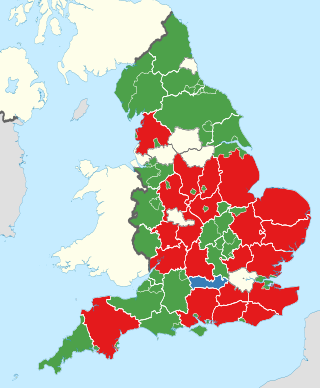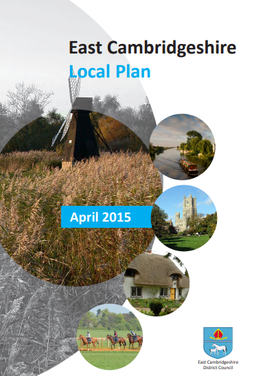
Referendums in the United Kingdom are occasionally held at a national, regional or local level. Historically, national referendums are rare due to the long-standing principle of parliamentary sovereignty. There is no constitutional requirement to hold a national referendum for any purpose or on any issue however the UK Parliament is free to legislate through an Act of Parliament for a referendum to be held on any question at any time.
A county council is the elected administrative body governing an area known as a county. This term has slightly different meanings in different countries.

A non-metropolitan county, or colloquially, shire county, is a subdivision of England used for local government.
Town and country planning in the United Kingdom is the part of English land law which concerns land use planning. Its goal is to ensure sustainable economic development and a better environment. Each country of the United Kingdom has its own planning system that is responsible for town and country planning, which outside of England is devolved to the Northern Ireland Assembly, the Scottish Parliament and the Senedd.

The Scottish Environment Protection Agency is Scotland's environmental regulator and national flood forecasting, flood warning and strategic flood risk management authority. Its main role is to protect and improve Scotland's environment. SEPA does this by helping business and industry to understand their environmental responsibilities, enabling customers to comply with legislation and good practice and to realise the economic benefits of good environmental practice. One of the ways SEPA does this is through the NetRegs environmental guidance service. It protects communities by regulating activities that can cause harmful pollution and by monitoring the quality of Scotland's air, land and water. The regulations it implements also cover the storage, transport and disposal of radioactive materials.

In the United Kingdom, devolved matters are the areas of public policy where the Parliament of the United Kingdom has devolved its legislative power to the national legislatures of Scotland, Wales and Northern Ireland, while reserved matters and excepted matters are the areas where the UK Parliament retains exclusive power to legislate.

The Planning Inspectorate for England is an executive agency of the Department for Levelling Up, Housing and Communities of the United Kingdom Government with responsibility for making decisions and providing recommendations and advice on a range of land use planning-related issues across England. The Planning Inspectorate deals with planning appeals, nationally significant infrastructure projects, planning permission, examinations of Local Plans and other planning-related and specialist casework.

The Town and Country Planning Act 1947 was an Act of Parliament in the United Kingdom passed by the Labour government led by Clement Attlee. It came into effect on 1 July 1948, and along with the Town and Country Planning (Scotland) Act 1947 was the foundation of modern town and country planning in the United Kingdom.

A development plan sets out a local authority's policies and proposals for land use in their area. The term is usually used in the United Kingdom. A Local Plan is one type of development plan. The development plan guides and shapes day-to-day decisions as to whether or not planning permission should be granted, under the system known as development control. In order to ensure that these decisions are rational and consistent, they must be considered against the development plan adopted by the authority, after public consultation and having proper regard for other material factors.
Development Management, formerly known as planning control, or development control, is the element of the United Kingdom's system of town and country planning through which local government or the Secretary of State, regulates land use and new building, i.e. development. It relies on a "plan-led system" whereby development plans are produced, involving various stages of public consultation prior to being adopted. Subsequently, development that requires planning permission, which is granted or refused with reference to the development plan as the starting point, then other material considerations are taken into account. The term "development management" is often abbreviated to DM.

The Town and Country Planning (England) Order 2015 is a statutory instrument, applying in England, that grants planning permission for certain types of development without the requirement for approval from the local planning authority.
A tree preservation order (TPO) is a part of town and country planning in the United Kingdom. A TPO is made by a local planning authority to protect specific trees or a particular area, group or woodland from deliberate damage and destruction if those trees are important for the amenity of the area. In Scotland TPOs can also be used to protect trees of historic or cultural significance. TPOs make the felling, lopping, topping, uprooting or otherwise willful damaging of trees without the permission of the local planning authority a legal offence, although different TPOs have different degrees of protection.
Planning law or town and country planning is the system by which the British government seeks to maintain a balance between economic development and environmental quality in England. The primary legislation for this field of law is provided by the Town and Country Planning Act 1947 and the Town and Country Planning Act 1990.

The fire services in the United Kingdom operate under separate legislative and administrative arrangements in England and Wales, Northern Ireland, and Scotland.
The New Towns Acts were a series of Acts of the Parliament of the United Kingdom to found new settlements or to expand substantially existing ones, to establish Development Corporations to deliver them, and to create a Commission to wind up the Corporations and take over their assets and liabilities. Of these, the more substantive acts were the New Towns Act 1946 and the Town Development Act 1952. "The New Towns Act [1946] was intended to pre-emptively direct urban growth and infrastructural development into new towns, thereby decentralising population and economic opportunity while inhibiting urban sprawl."
The history of fire safety legislation in the United Kingdom formally covers the period from the formation of the United Kingdom of Great Britain and Ireland in 1801 but is founded in the history of such legislation in England and Wales, and Scotland before 1708, and that of the Kingdom of Great Britain from 1707 to 1800.
Development Management is the name given to the element of Scotland's system of town and country planning, through which national government, local government and national park authorities regulate land-use and development.
Planning use classes are the legal framework which determines what a particular property may be used for by its lawful occupants. In England and Wales, these are contained within the text of Town and Country Planning Order 1987.

The Planning and Environment Act 1987 is an Act passed by the Parliament of Victoria in 1987 to provide a framework for urban planning and the use and development of land in the State of Victoria.









